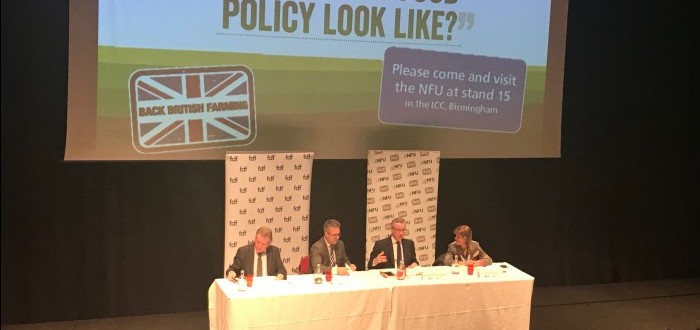Defra Secretary Michael Gove used his main speech at the Conservative Party Conference to describe the country’s farmers as the ‘backbone of Britain’.
But while he also stressed his desire to maintain high standards of production on UK farms after we leave the EU, he left key questions unanswered when it came to whether those same standards would be applied to imports.
After thanking his fellow Defra Ministers and the Department’s ‘brilliant’ civil servants during his main conference speech in Birmingham, Mr Gove said: “I also want to thank tens of thousands of more great people who I get to work with. They are people upon whom this country depends so much. They are the backbone of Britain. Our farmers. Let’s show them our appreciation (cue, applause from the audience).”
He outlined the steps Defra was taking in the new Agriculture Bill to ‘help farmers be more productive and ensure they get a fair price for their produce’, including help to invest in new technology ‘to help them provide a harvest for the world’.
He promised that leaving the EU would allow the Government ‘to act faster and more flexibly to sweep away the barriers which have stood in the way of modernising farming’. There will be a new food strategy for Britain, ensuring that ‘food production is truly sustainable, replenishing the soil, using energy wisely and supporting innovation’.
“And we will reform food labelling so that we uphold the highest animal welfare standards and give consumers the information they need to stay safe,” he said, before announcing the Government will invest £15 million in reducing waste across the food supply chain.
NFU-FDF fringe
When Mr Gove appeared at the NFU-Food and Drink Federation (FDF) fringe event on Monday evening, he reinforced these messages. He described Brexit as a ‘huge opportunity for British farmers’, but said this could only be grasped if the UK maintained its reputation for high food production standards.
He stressed that he ‘certainly doesn’t want to undermine the position of British farmers by lowering our existing high animal and environmental standards’. Both he and Trade Secretary Liam Fox have been clear on that, he said.
But Mr Gove was less clear on the subject on whether the same standards would be applied to food imports under future post-Brexit trade arrangements, an issue of critical importance to the pig sector.
The issue was raised right at the very start of the night by NFU president Minette Batters, who used the example of the 1999 sow stalls ban to highlight the need for the Government to ensure it does not raise UK standards – and costs – while allowing farmers to be undercut by cheaper, lower standard imports. “We support the whole public money for public goods agenda, but this is about exporting our conscience abroad and having a level playing field,” she said.
The example of the sow stall ban had been made by Environment, Food and Rural Affairs Committee chair Neil Parish at an earlier fringe meeting.
When the import question was raised again, the Defra Secretary stressed only that he didn’t think ‘the public would allow us to import food produced to lower standards. As well as consumers not liking it, it would also ‘damage the good work British farmers have done’, he said.
Near the end of the event, Mr Gove was asked whether the UK might still import products produced using neonicotinoid seed treatments even if they were banned in the UK.
“I absolutely take your point,” he said. “But there will be some areas where we do have higher standards than other countries. It is not the case that we are deliberately seeking to ensure that we import more from countries that have lower standards.”
Carcase balance
On exports, Mr Gove said he recognised the farming sector’s desire to secure frictionless trade with the EU, given the reliance of some sectors, notably sheep, on EU exports.
But he stressed the importance of markets, beyond the EU, highlighting the benefits of exports destinations like China for carcase balance for the pig sector. By adding more value to the carcase, these markets enable UK farmers to produce more pork for the EU market, he said.




